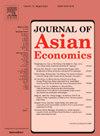Mobile money and financial inclusion: International evidence from informal sector enterprises in Asia and Africa
IF 3.4
3区 经济学
Q1 ECONOMICS
引用次数: 0
Abstract
Mobile money (m-money)–fintech platforms that enable payments, transfers, and savings via mobile phones–has revolutionized the payment landscape in Africa, surpassing bank accounts in some regions. Studies have examined the effects of m-money on the financial inclusion of previously unbanked populations at the macro level. However, research on how fintech’s m-money enhances access to conventional banking services for microentrepreneurs and informal businesses remains limited. Using instrumental variable probit models and non-parametric methods on a cross-country sample from the World Bank’s informal enterprise surveys of sub-Saharan and Asian countries, this study finds robust evidence that m-money significantly increases informal enterprises’ transitions to deposit-based and credit-based financial inclusion. Heterogeneity analyses reveal that m-money significantly enhances microfinance credit access for informal enterprises in Asian countries compared with African countries. However, its effect on bank credit access is nearly the same in both regions, with statistically more significant coefficient estimates in the African countries. Furthermore, mechanism test analysis shows that the observed financial inclusion effect of fintech’s m-money stems from its influence on profitability and trade credit provision, which improves access to traditional financial services. An important policy implication is that fintech's m-money can serve as a precursor to broader formal financial inclusion in informal-sector enterprises.
移动货币与普惠金融:来自亚洲和非洲非正规部门企业的国际证据
移动货币(m-money)是一种通过手机实现支付、转账和储蓄的金融科技平台,它彻底改变了非洲的支付格局,在一些地区甚至超过了银行账户。研究从宏观层面考察了移动货币对以前没有银行账户的人口的金融包容性的影响。然而,关于金融科技的移动货币如何提高微型企业家和非正规企业获得传统银行服务的机会的研究仍然有限。本研究利用工具变量概率模型和非参数方法对世界银行在撒哈拉以南和亚洲国家开展的非正式企业调查的跨国样本进行分析,发现强有力的证据表明,移动货币显著促进了非正式企业向以存款和信贷为基础的普惠金融转型。异质性分析表明,与非洲国家相比,移动货币显著提高了亚洲国家非正规企业获得小额信贷的机会。然而,它对银行信贷获取的影响在两个区域几乎相同,非洲国家的统计系数估计更为显著。此外,机制检验分析表明,金融科技移动货币的金融普惠效应源于其对盈利能力和贸易信贷提供的影响,这改善了传统金融服务的可及性。一个重要的政策含义是,金融科技的移动货币可以作为非正式部门企业更广泛的正式金融包容性的先驱。
本文章由计算机程序翻译,如有差异,请以英文原文为准。
求助全文
约1分钟内获得全文
求助全文
来源期刊

Journal of Asian Economics
ECONOMICS-
CiteScore
4.70
自引率
9.40%
发文量
90
期刊介绍:
The Journal of Asian Economics provides a forum for publication of increasingly growing research in Asian economic studies and a unique forum for continental Asian economic studies with focus on (i) special studies in adaptive innovation paradigms in Asian economic regimes, (ii) studies relative to unique dimensions of Asian economic development paradigm, as they are investigated by researchers, (iii) comparative studies of development paradigms in other developing continents, Latin America and Africa, (iv) the emerging new pattern of comparative advantages between Asian countries and the United States and North America.
 求助内容:
求助内容: 应助结果提醒方式:
应助结果提醒方式:


